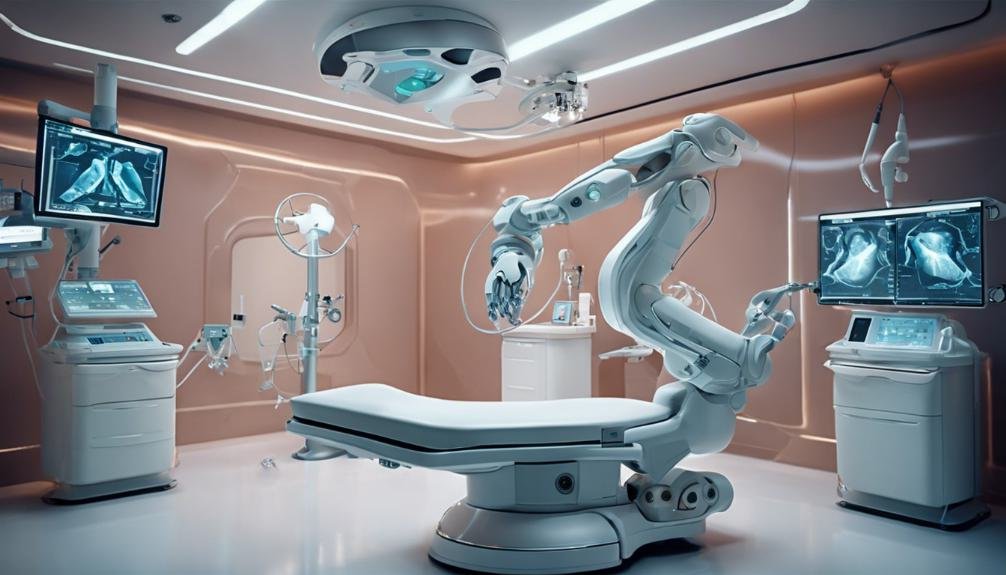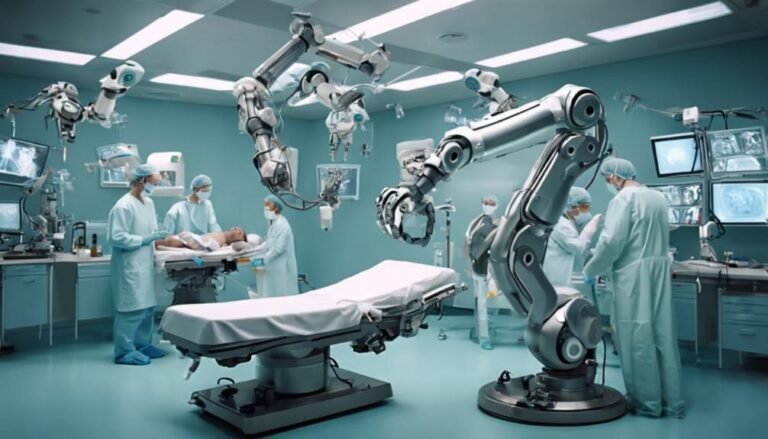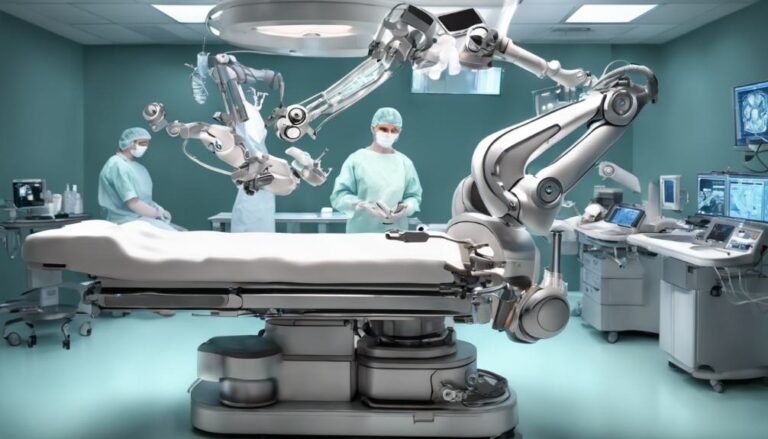AI in Plastic Surgery
In the field of plastic surgery, AI is reshaping the landscape by offering unprecedented advancements in precision and personalized care. Imagine a future where surgical procedures are tailored to each patient's unique anatomy and needs, resulting in safer and more effective outcomes. The integration of artificial intelligence in plastic surgery not only streamlines preoperative planning and enhances surgical accuracy but also opens up possibilities for groundbreaking innovations that could revolutionize the field.
Key Takeaways
- AI optimizes surgical outcomes through predictive analytics.
- Robotic assistance ensures surgical precision in incisions.
- AI enhances tissue manipulation for improved outcomes.
- Predictive analytics anticipate postoperative complications.
- Personalized treatment plans are developed using AI algorithms.
AI in Preoperative Planning
AI plays a pivotal role in preoperative planning by analyzing patient data to optimize surgical outcomes and enhance precision in plastic surgery procedures. Machine learning algorithms are utilized to process vast amounts of data, including medical images, patient history, and predictive analytics, to assist surgeons in making informed decisions. By analyzing this data, AI can help predict potential complications, recommend personalized treatment plans, and improve overall surgical accuracy.
Surgical simulations powered by AI allow surgeons to virtually plan and practice complex procedures before entering the operating room. These simulations provide a realistic environment where surgeons can test different approaches, evaluate potential outcomes, and refine their techniques. Through AI-driven simulations, surgeons can enhance their skills, reduce the risk of errors, and ultimately improve patient safety.
Enhanced Surgical Precision With AI
With AI technology, you can expect enhanced surgical precision in plastic surgery procedures. This means AI can assist in achieving greater incision accuracy, improving tissue manipulation precision, and ultimately leading to better surgical outcomes.
AI Aiding Incision Accuracy
Achieving enhanced surgical precision in plastic surgery procedures is made possible through the strategic integration of artificial intelligence systems that assist in ensuring accurate incisions. Robotic assistance plays an essential role in aiding surgeons during incision-making processes. By utilizing AI algorithms, robotic systems can enhance the accuracy of incisions, leading to improved surgical outcomes.
Virtual simulations are another vital component that contributes to incision accuracy in plastic surgery. Surgeons can utilize advanced virtual simulation tools during the surgical planning phase to map out precise incision points and trajectories. These simulations allow for a detailed visualization of the patient's anatomy, enabling surgeons to plan and execute incisions with utmost precision.
Through the combination of robotic assistance and virtual simulations, plastic surgeons can achieve unparalleled levels of incision accuracy, ultimately resulting in enhanced surgical outcomes and patient satisfaction.
The integration of AI technologies in plastic surgery continues to revolutionize the field, offering new possibilities for improved procedural precision and patient care.
Precision in Tissue Manipulation
Utilizing advanced robotic systems and virtual simulations enhances surgical precision in plastic surgery procedures by facilitating precise tissue manipulation.
Through the integration of AI technology, plastic surgeons can now leverage sophisticated tissue modeling techniques to plan and execute intricate surgical procedures with unprecedented accuracy.
Computer simulations play a vital role in augmenting traditional surgical techniques by providing real-time feedback and predictive analysis on tissue manipulation, enabling surgeons to make informed decisions during the operation.
Improved Surgical Outcomes
By integrating AI technology into plastic surgery procedures, surgeons can enhance surgical precision, leading to improved outcomes for patients undergoing cosmetic or reconstructive surgeries. AI algorithms can analyze vast amounts of patient data, pre-operative images, and surgical plans to assist surgeons in making more precise incisions and adjustments during procedures. This increased accuracy can result in better aesthetic outcomes, improved symmetry, and reduced complications post-surgery.
Enhanced surgical precision with AI not only contributes to better cosmetic results but also plays a significant role in optimizing patient satisfaction. When surgeries are performed with greater accuracy, patients are more likely to achieve their desired outcomes, leading to higher levels of satisfaction with the overall procedure. Additionally, the improved precision can reduce the need for revision surgeries, further enhancing patient contentment.
Furthermore, AI's role in enhancing surgical precision can also impact recovery time for patients. By minimizing errors and ensuring precise surgical techniques, AI can help reduce complications during and after surgery, potentially leading to quicker recovery periods for patients undergoing plastic surgery procedures.
Ultimately, the integration of AI technology in plastic surgery holds the promise of improving patient satisfaction and optimizing recovery times for individuals seeking cosmetic or reconstructive treatments.
AI's Role in Postoperative Monitoring
Monitoring postoperative progress using artificial intelligence allows for real-time analysis of patient data to identify any potential complications or issues early on. AI systems can continuously collect and analyze critical signs, surgical site images, and other patient-specific data to provide surgeons with immediate feedback on the patient's recovery status.
Through real-time monitoring, AI algorithms can detect subtle changes that may indicate complications, such as infections or abnormal healing processes, enabling healthcare providers to intervene promptly.
Personalized Treatment Plans Through AI
Artificial intelligence in plastic surgery facilitates the development of personalized treatment plans tailored to individual patient needs and characteristics. Treatment customization plays an essential role in enhancing patient satisfaction and outcomes. By utilizing advanced AI algorithms, plastic surgeons can optimize treatment plans to address specific concerns and goals effectively.
AI algorithms analyze vast amounts of data, including patient medical history, imaging results, and desired outcomes, to create personalized treatment strategies. These algorithms can predict potential risks, suggest the most suitable procedures, and even simulate post-treatment results. Through this tailored approach, patients receive treatments that align with their unique requirements, leading to higher satisfaction rates.
Furthermore, AI enables continuous monitoring and adjustment of treatment plans based on real-time feedback and progress tracking. This dynamic optimization ensures that patients receive the most effective and personalized care throughout their plastic surgery journey. By leveraging AI for treatment customization, plastic surgeons can enhance patient experiences and achieve superior aesthetic results.
Predictive Analytics in Plastic Surgery
Utilizing predictive analytics in plastic surgery allows for the anticipation of potential outcomes based on data analysis and patient characteristics. AI in patient consultations plays an essential role in this process by analyzing vast amounts of patient data to predict surgical outcomes accurately.
Predictive modeling, a pivotal component of this approach, uses advanced algorithms to forecast how a particular procedure may impact an individual based on their unique traits and medical history.
Through data analysis, predictive analytics can assist plastic surgeons in making more informed decisions regarding treatment plans and expected results. By leveraging this technology, surgeons can tailor their approach to each patient, taking into account variables that may influence the outcome of the surgery.
This personalized approach enhances patient satisfaction and reduces the likelihood of complications post-surgery.
AI Applications in Reconstructive Surgery
Incorporating AI applications in reconstructive surgery enhances the precision and efficiency of surgical procedures, ultimately improving patient outcomes. AI plays an essential role in scar reduction by analyzing vast amounts of data to develop personalized treatment plans. Machine learning algorithms are utilized in skin graft procedures to optimize the selection of donor sites and predict the success rate of grafts.
AI in scar reduction involves analyzing factors such as skin type, wound location, and healing patterns to recommend the most effective treatment options. By leveraging AI technology, plastic surgeons can tailor interventions to individual patients, leading to better aesthetic results and faster recovery times.
Additionally, machine learning algorithms aid in skin graft surgeries by identifying patterns in patient data that influence graft acceptance and integration. This enables surgeons to make informed decisions regarding graft selection and placement, increasing the likelihood of successful outcomes for reconstructive procedures.
The integration of AI in reconstructive surgery represents a significant advancement in enhancing surgical precision and optimizing patient care.
Safety Improvements With AI Technology
Enhancing patient safety through the integration of AI technology in plastic surgery procedures is essential in ensuring excellent outcomes and minimizing risks. AI offers advanced capabilities in risk assessment and predictive modeling, revolutionizing patient safety protocols. By utilizing AI algorithms, plastic surgeons can analyze vast amounts of data to identify potential risks before surgery, allowing for proactive interventions to mitigate complications.
AI-driven predictive modeling enhances patient safety by providing personalized risk assessments based on individual patient data. These models consider various factors such as medical history, genetic predispositions, and procedure-specific risks to predict potential adverse events accurately. Through continuous data analysis, AI systems can adapt and improve their predictive capabilities, leading to more accurate risk assessments over time.
Incorporating AI technology into plastic surgery practices not only enhances patient safety but also streamlines decision-making processes for surgeons. By harnessing the power of data analysis and predictive modeling, plastic surgeons can optimize treatment plans to prioritize patient well-being and achieve excellent surgical outcomes.
Conclusion
To sum up, AI isn't just transforming the field of plastic surgery – it's revolutionizing it. With its ability to optimize planning, enhance precision, monitor progress, and personalize treatment, AI is taking surgical outcomes to unprecedented levels of success.
The future of plastic surgery is brighter and safer than ever before, thanks to the incredible advancements that AI technology brings to the operating table. Get ready to witness a new era of plastic surgery excellence with AI leading the way.







